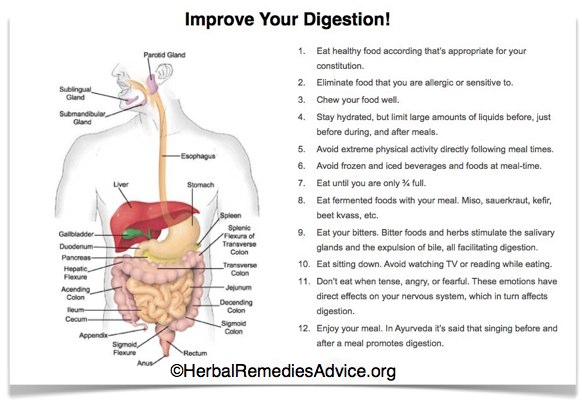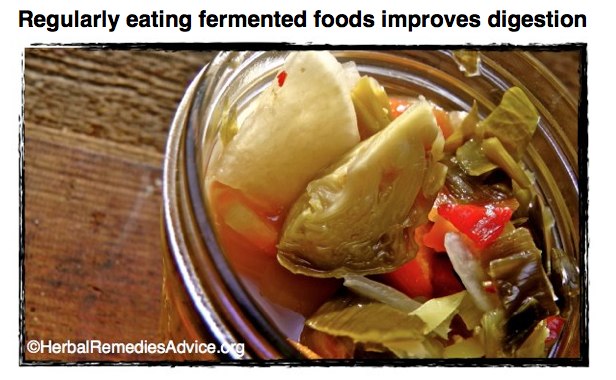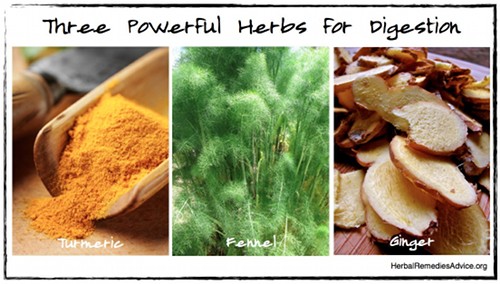Get weekly tips, recipes, and my Herbal Jumpstart e-course! Sign up for free today.

Human Digestive System
Share this! |
|
We can’t necessarily say that one system of the body is more important than the other, as we need all of them to operate optimally. However, special props can be given to the human digestive system. In this set of organs, mucosa, secretions, and nerves lies the ability to turn nutritious food, which is completely unusable in its whole form, to molecules tiny enough for the body to assimilate and use for various functions.
However, unless something goes wrong it’s easy to stop thinking about the food that goes into your mouth until it comes out the other end, hopefully 12 – 24 hours later. Digestion is largely involuntary, meaning that, after you’ve done the conscious act of chewing and swallowing, your amazingly intelligent body takes over (Read more about the Digestive System Anatomy here).
Ideas for Healthy Food Digestion
In many forms of traditional medicine poor digestion is seen as the root of many diseases. Below we'll explore some steps for you to maintain a healthy human digestive system.
Eat healthy food according to your constitution
One person’s food is another person’s poison!
I know that wading through contemporary dietary information is confusing. One dietary dogma says to avoid all meat, another to eat only meat! The most important concept to understand is that we are all different and what works for Aunt Jane doesn’t necessarily work for you.
To determine which foods work best for you I highly recommend the book by William Wolcott:
Rather than proclaiming dietary dogma or that everyone should eat in one specific way, it teaches self awareness to help you figure out what foods work for you. Chris Kresser also has a great product, the Personal Paleo Code, that really guides you through this process.
Eliminate food that you are allergic or sensitive to
Some people are deathly allergic to certain foods. A tiny piece of shellfish or peanuts can induce anaphylactic shock and close up someone’s throat. It doesn’t take long for a person to discover they have these severe allergies.
Another type of food allergy is more appropriately called a food sensitivity or food intolerance. These foods incite a systemic inflammatory response and can rear their head as digestive difficulties or skin blemishes, and even play a role in autoimmune disease.
The best way to determine if you have a food sensitivity is to do an elimination diet. For six weeks you eat a simple diet with no common allergens. Meat, vegetables, rice, and quinoa are good examples of this elimination diet. During those six weeks note any changes you experience. After six weeks you slowly add in those common food allergens. I choose one a week. Wheat, gluten, dairy, corn and soy are common food allergens.
Chew your food well
Each section of our human digestive system has a particular role. Your teeth are there to physically breakdown the food you consume. Do you stomach a favor by letting your teeth do their job! There’s no need to count to 100, just be sure that your food is well mashed before swallowing.
Stay hydrated, but limit large amounts of liquids before, during, and after meals
Large amounts of liquids right before a meal can dilute your digestive juices, impairing the breakdown of your food. Iced beverages are especially problematic!
Avoid extreme physical activity directly following meal times
Physical exercise puts your body in a sympathetic nervous system state, sometimes referred to as the flight or fight state. Once there, the body’s non-critical functions shut down, digestion being one of them.
Avoid frozen and iced beverages and foods at meal-time
A common analogy used in many systems of traditional medicine is our digestive system being associated with fire. Sometimes this is called our metabolic fire. The digestive process needs warmth in order to operate optimally. Frozen and iced beverages hamper the human digestive system.
Eat until you are feeling only ¾ full
Eating slowly and enjoying your meal helps you to realize when you’ve had enough. Oftentimes people use a feeling of overt fullness such as bloating to signal they are done eating. This leads to sluggishness and chronic overeating.
Eat fermented foods with your meal
Fermented foods help your body maintain a healthy gut flora and they are ideally eaten with every meal. Some common fermented foods include miso, sauerkraut, kefir, yogurt, beet kvass, etc.
Eat your bitters
Bitter foods and herbs stimulate the digestive process, creating a cascade of digestive secretions from your salivary glands to the expulsion of bile and pancreatic enzymes. Bitter herbs include dandelion leaves, orange peels, gentian, yellow dock, and hops.
Eat sitting down. Avoid watching TV or reading while eating
Eating is a sacred time. Turn off the rest of your life and focus!
Don’t eat when tense, angry, or fearful
These emotions have direct effects on your nervous system, which in turn affects digestion.
Enjoy your meal
In Ayurveda it is said that singing helps to promote digestion.
Summary
Prioritize your digestion. You may feel that a little heartburn or a little constipation is normal or not a big deal, but since our ability to digest lies at the heart of our wellness it needs to be operating optimally! It is far better to prevent disease by adopting healthy digestion habits than attempt to cure a disease that has already taken root in the body.
Explore Specific Human Digestive System Disorders
- Constipation: Find a Good Constipation Home Remedy!
- Peptic Ulcer
- Winter Detox Diet
- Irritable Bowel Syndrome

Rosalee is an herbalist and author of the bestselling book Alchemy of Herbs: Transform Everyday Ingredients Into Foods & Remedies That Healand co-author of the bestselling book Wild Remedies: How to Forage Healing Foods and Craft Your Own Herbal Medicine. She's a registered herbalist with the American Herbalist Guild and has taught thousands of students through her online courses. Read about how Rosalee went from having a terminal illness to being a bestselling author in her full story here.


